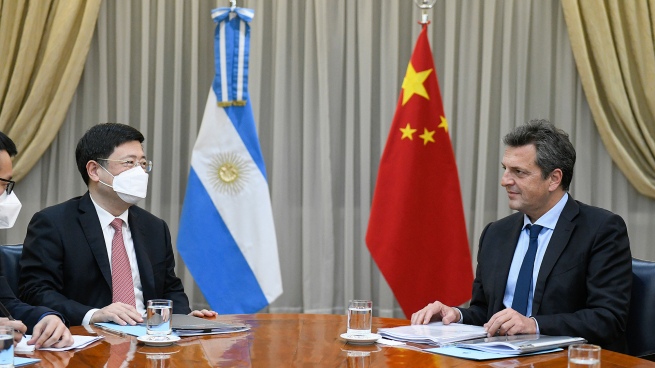The Minister of Economy, Sergio Massa, received the ambassador of the People’s Republic of China, Zou Xiaoli; occasion in which they reaffirmed the will of both countries to “articulate strategies that promote economic development based on specific projects”.
Massa and Zou highlighted “the importance of existing bilateral instruments” to strengthen bilateral cooperation, “such as the opportunities that are opening up within the framework of the Belt and Road Initiative”according to sources from the Treasury portfolio.
Both officials highlighted the importance of the treaties signed by Argentina and China, such as the Framework Agreement on Economic Cooperation and Investment, the Complementary Agreement on Cooperation in Infrastructure and the Joint Action Plan 2019-23.
“I had a meeting with the Chinese ambassador, Zou Xiaoli. We reviewed the current projects they have in Argentina and advanced in new cooperation opportunities that would allow the arrival of new investments in the country, such as the Belt and Road Initiative”, Massa said through a message posted on his Twitter social network account.
Spokesmen for the Ministry of Economy indicated that, “in addition to reviewing the status and progress of the works in progress”Massa and Zou discussed “the formation of a permanent working group in order to advance in the definition of priority infrastructure projects of mutual interest, together with other alternatives for economic and commercial cooperation.”
Likewise, they promised “to continue working to deepen the financial link through various mechanisms such as the expansion of the currency swap, encourage the arrival of more investments in strategic sectors such as banking, mining, hydrocarbons, renewable energies, services, infrastructure and communications “
They also addressed the implementation of mechanisms aimed at “expediting the opening of markets so that more products from the Argentine regional economies are marketed in China.”
“It is also necessary to explore alternatives and bilateral financial instruments that allow balancing the current trade imbalances”, highlighted Massa and Zou
In relation to this last point, the informants from Economy stated that Massa and the ambassador pondered “the notable increase in bilateral trade in the last 50 years.”
In this regard, they recalled that in the last three years the exchange averaged USD 15,000 million, and the minister emphasized “the need to find a balance in the trade balance” that is currently favorable for China, “as a pending point and center of the bilateral agenda”.
In this sense, Massa highlighted Argentina’s strategic availability in terms of energy, proteins, critical minerals and human resources as key assets to increase sales of Argentine value added to China.
The ambassador, for his part, made it known that the growing Chinese middle class, which amounts to more than 500 million people, “is very interested in importing quality Argentine products, while also showing interest in increasing productive cooperation with the in order to increase the stock of national goods available to supply the Asian market”.
???? I had a meeting with the Chinese ambassador, Zou Xiaoli. We review the current projects that they have in Argentina and we advance in new cooperation opportunities that would allow the arrival of new investments to the country, such as the Belt and Road Initiative. pic.twitter.com/cyQk4eA7lJ
– Sergio Massa (@SergioMassa) August 12, 2022
For these objectives, “it is also necessary to explore alternatives and bilateral financial instruments that allow balancing current trade imbalances,” Massa and Zou highlighted by way of conclusion of this meeting.
In a recent joint interview with several media outlets, Zou had assured that he “would very much like” to meet with Massa to analyze the bilateral economic relationship and implement agreements and contracts signed between the two countries.
In that meeting with the press, he assured that Beijing “is not looking for a surplus” with Argentina but rather to balance the commercial exchange “on the basis of a more important balance”, and reiterated the intention of integrating the country as a new member of “the great family of the Briks”.
The diplomat defined the proposal to join the Brics as proof of the “important status” of Argentina, which in 2022 will celebrate 50 years of diplomatic relations with the People’s Republic, and considered that the inclusion of emerging economies in that forum would allow “even enriching plus the comprehensive strategic association” that both nations signed in 2014, to cooperate “in more important scenes and at higher levels”.
Asked about the trade balance between the two countries, which this year shows a deficit of some US$7 billion for Argentina, Zou attributed the imbalance to “the different commercial and industrial structures, as well as the supply and demand relationships,” but then he stressed that China seeks to collaborate to expand Argentina’s export capacity, as well as the competitiveness of its industries and products.
China is one of the most relevant investors in Argentina with a stock of Foreign Direct Investment of US$ 1,111 million, although with a strong concentration in the banking sector (74%), in commerce (10%) and in mining (10%). ).
Massa and the Chilean ambassador and analyzed ways to “promote economic integration”
The Minister of Economy, Sergio Massa, received the Chilean ambassador to Argentina, Bárbara Figueroa, in a meeting in which the ways to “promote economic integration” were analyzed, according to the official on his social networks.
“I received the ambassador of Chile, Bárbara Figueroa, a country with which we share enormous historical and commercial ties. It is key that we continue working on promoting economic, energy and mining integration to guarantee a better future for both countries,” Massa said in a message posted on his Twitter account.
For her part, the representative of the trans-Andean country in Argentina thanked Massa for “today’s meeting”, and considered in a message on social networks that both countries face “a complex time, where the challenge continues to be to guarantee the well-being of our peoples”.
“Chilean-Argentine unity is an imperative,” he added.
Figueroa is a professor of philosophy, served as president of the Central Unitaria de Trabajadores de Chile (CUT) from 2012 to 2021, and previously headed the College of Teachers of Chile.
Since March 31, 2022, she has served as her country’s ambassador to Argentina, appointed by President Gabriel Boric.








